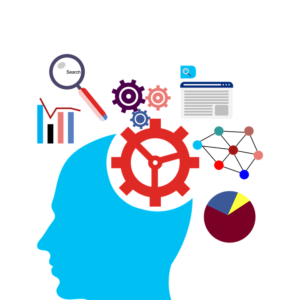Digital marketing refers to the promotional efforts implemented to promote products and brands through electronic media. It enables organizations to analyze their marketing campaigns to find out what is positively working and what is not working. Businesses take advantage of the power of digital channels like Google Search, Email as well as their websites, to connect with current and potential customers.
The web has changed the way people buy and buy goods. People now spend a lot of time searching on the web for things they want to buy or want to know about products and services before actual purchase. For this reason, organizations are respecting their digital marketing strategy to target online audiences. Effective marketing involves connecting with your audience at the right time and in the right place. Therefore, the best way to target potential customers is to reach them where they are spending maximum time on the internet.
In simple words, digital marketing refers to any form of online marketing. This includes approaches such as inbound marketing to entice, change, and delight online customers.
Searching for places of digital marketing
Digital marketing involves a vast spectrum of assets and strategies under the umbrella, such as online branding through digital advertising, online brochures, email marketing and more. To fully employ the power of digital marketing, marketers should know how these assets and strategies support and influence their goals.
To understand how to do digital marketing, let’s expedite the most common strategies and assets to be applied in digital marketing:
Property
- Your web pages
- blog posts
- Whitepaper and ebook
- Article information
- Interactive tools
- Social media channel
- Earned online coverage through social media and online reviews
- Online brochures
- Branding property such as company logo
Tactics
Search Engine Optimization (SEO) – incorporates the techniques applicable to optimizing your website so that it ranks high in SERPs so that the biological traffic generated by your website increases.
Content Marketing – Building promotional material to create brand awareness, lead generation, increase traffic or entice more potential customers.
Inbound Marketing – Refers to a full-funnel approach to attract and delight online customers.
Social Media Marketing – Includes practices to promote your brand and content on various social media channels, to increase brand awareness, generate more positive leads for your business and drive more traffic.
Pay-Per-Click (PPC) – Whenever a person clicks on your ad, a publisher applies a way to drive traffic to your web pages by paying an amount.
Affiliate Marketing – Includes display-based advertising for which you receive commission on promoting services or products of someone else on your website.
Native Advertising – mainly refers to content-led advertisements that appear on a platform with other non-paid content.
Marketing Automation – Refers to the marketing software used to automate marketing activities. They are used primarily to automate repetitive tasks such as sending emails, promoting content on social media, and posting content on a website.
Email Marketing – This is a way to communicate with your audience through promotional material, event information and discounts email.
Online PR – implements digital publishing, blogs, articles and other content-based websites. It’s similar to the traditional PR in online space.
Is Digital Marketing Suitable For All Businesses?
Digital marketing can practically work for any business of any size in any industry. Despite the services sold by your organization or the services provided by your business; Digital marketing can help your buyer create personality so that you can recognize the needs of your audience and make valuable online content. However, digital marketing works slightly different for different organizations.
B2B organization
For B2B organizations, digital marketing efforts are centered around the generation of online leads. For this reason, your marketing strategy should be designed to attract the highest quality leads through your website, as well as support your digital sales channels for salespeople.
B2C organizations
For B2C organizations, digital marketing efforts are focused on attracting more people to your website to make more potential customers without involving any vendor. For this reason, your marketing strategy focuses on how to build a quick buyer’s journey from the customer’s land on your website from the time that he makes a purchase. This means that your product and portrayed content should define a strong call-to-action.
Benefits of Digital Marketing
Digital Marketing provides accurate real-time results to marketers. Digital marketing allows you to finally measure the ROI of your marketing efforts. The following parameters provide a clear indication of how your web pages are valid in the field of digital marketing:
Website Traffic – Digital Marketing allows you to scan the exact number of people who visit your website in real time using various analytics software. You can see the frequency of their visit, the number of pages visited, the tools and locations used to access the pages as well. With this intelligence, you can prioritize your marketing channels with the number of people brought to your website by those channels. Digital marketing allows you to identify the trends and patterns that affect people’s behavior in their buyer’s journey. Depending on the information, you can make informed decisions about your strategy to attract more customers to your website.
Lead Generation Through Content Performance – With digital marketing, you can measure the number of people who host your content online. Whenever people download your content, you can generate qualified leads.
Attribution Modeling – With the right digital marketing tools and technologies, you can locate your sales history with the customer. This is called attribution modeling. It helps you identify trends and patterns that people research and purchase your product. With this information, you can make informed decisions about your marketing strategy by refining your sales cycle.
Content for digital marketing
Your content depends on your audience. You have to make a buyer to identify the expectations of your audience. Your online content should meet these expectations. Then, you have to mapping the material according to the person’s stage in the material as well as in the person’s journey. You can publish blog posts, infographics, short videos or eBooks and research reports to attract your attention. Case studies and testimonials also work as an effective tool to impress customers in shopping.
Is the key to patience
Digital marketing is not a constant speed. You can not see immediate results despite effective tools to measure the ROI. The results depend on the effectiveness and implementation level of your digital marketing strategy. You should spend enough time to build on your buyers’ extensive work to identify your needs. To entice more customers, you should focus on creating quality content. With the effective planning and implementation of your digital marketing strategy, you can see strong results in a short time.




